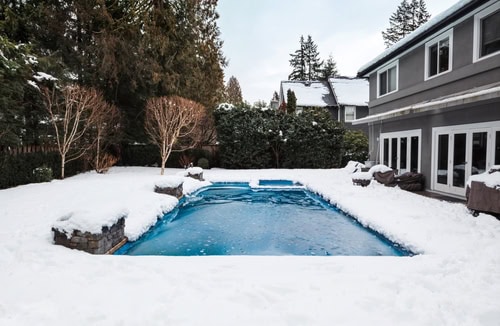Why Are You Not Supposed to Open Your Pool in the Winter?

Why You Shouldn’t Open Your Pool in Winter
You’ve invested thousands of dollars in your backyard oasis, so it’s natural to want to use it year-round. But opening your winter pool during the colder months can lead to expensive damage and ongoing headaches that far outweigh any benefits.
While the idea of a heated pool during winter might sound appealing, the reality involves significant risks to your pool’s structure, equipment, and your wallet. Freezing temperatures pose serious threats to plumbing systems, while increased maintenance demands and skyrocketing energy costs make winter pool operation impractical for most homeowners.
Understanding why pools are typically closed during winter months will help you make informed decisions about your pool’s care and prevent pool damage that could cost thousands to repair.
The Risks of Leaving a Pool Open in Winter
1. Freezing Damage
The most serious threat to your winter pool comes from freezing temperatures. When water freezes, it expands by approximately 9%, creating tremendous pressure that can crack pipes, damage pumps, and even fracture your pool’s shell or liner.
Your pool’s plumbing system is particularly vulnerable. Water trapped in pipes, filters, and pump housings will freeze solid during cold snaps, leading to burst pipes and damaged equipment. These repairs can easily cost several thousand dollars and may require extensive excavation to access underground plumbing.
Even pool surfaces aren’t immune. Concrete pools can develop cracks when frozen water expands within small fissures, while vinyl liners may tear or separate from the pool walls. Fiberglass pools, though more flexible, can still suffer damage if water freezes in the plumbing connections.
2. Increased Maintenance Challenges
Maintaining a winter pool requires constant vigilance and significantly more work than summer maintenance. Algae growth continues even in cold water, particularly when sunlight can still penetrate the surface. Without proper circulation and chemical balance, your crystal-clear pool can quickly turn into a green, murky mess.
Debris management becomes especially challenging during the winter months. Falling leaves, twigs, and other organic matter decompose in the water, creating additional strain on your filtration system and throwing off your water chemistry. Wind can blow debris into uncovered pools faster than you can remove it.
Water chemistry also becomes more difficult to maintain. Cold temperatures affect how chemicals dissolve and work in your pool water, requiring more frequent testing and adjustments to keep bacteria and algae at bay.
3. Energy Consumption Costs
Heating a winter pool requires enormous amounts of energy. Pool heaters must work continuously to maintain comfortable water temperatures when ambient air temperatures drop significantly below the desired pool temperature.
Your monthly utility bills can increase by hundreds or even thousands of dollars, depending on your pool size, local climate, and energy costs. Heat pumps become less efficient in cold weather, while gas heaters consume fuel at alarming rates to combat heat loss from the pool surface and surrounding air.
Running your circulation system 24/7 also adds to energy consumption. Pumps must operate continuously to prevent freezing, further increasing your electricity costs throughout the winter months.
4. Equipment Malfunctions
Cold temperatures cause various pool equipment to malfunction or operate inefficiently. Salt chlorinators typically shut down when water temperatures drop below 50-60°F, forcing you to rely on alternative sanitizers like chlorine floaters, which may not maintain consistent water quality.
Pool heat pumps lose efficiency dramatically as outdoor temperatures drop, and many units won’t operate at all once temperatures fall below certain thresholds. This can leave you without heating capability during the coldest periods when you need it most.
Automatic pool cleaners, chemical feeders, and other accessories may also experience problems in cold weather, requiring manual intervention or replacement of components damaged by freezing conditions.
Why Pools Are Typically Closed in Winter
1. Protection from the Elements
Winterizing your pool provides comprehensive protection against harsh weather conditions. Pool covers block debris, reduce evaporation, and help maintain water temperature. Proper winterization includes draining water from plumbing lines, adding antifreeze to remaining water, and protecting equipment from freezing.
This systematic approach to winter pool closure shields your investment from the most damaging effects of cold weather, snow, ice, and winter storms that could otherwise cause significant harm to pool components.
2. Cost Savings
Closing your pool for winter generates substantial savings across multiple areas. You’ll eliminate heating costs, reduce chemical usage dramatically, and minimize electricity consumption from pumps and other equipment.
Professional winterization typically costs a few hundred dollars but prevents thousands in potential repair bills. The chemicals used for winterization also cost far less than maintaining proper water chemistry throughout the entire winter season.
Reduced equipment runtime also extends the lifespan of pumps, heaters, and filters, delaying replacement costs and minimizing wear and tear on these expensive components.
3. Preventing Damage
Proper pool closure and winterization represent the most effective strategy to prevent pool damage during cold months. Draining water from plumbing lines eliminates the risk of freeze damage, while adding pool antifreeze to trap areas provides additional protection.
Pool covers protect the surface from debris and ice formation, while lowering water levels below skimmers and returns prevents damage to these vulnerable connection points. This comprehensive approach addresses all potential failure points before problems occur.
Protect Your Pool Investment with Aqua Leisure Pools and Spas
Investing in an in-ground pool is a significant decision, and having the right partner to guide you through the process makes all the difference. At Aqua Leisure Pools and Spas, we specialize in designing and installing high-quality pools tailored to your needs and preferences. Whether you’re looking to create a relaxing backyard retreat or an entertainment space for family and friends, our team is here to bring your vision to life. Contact us today to start your in-ground pool installation journey!
Posted by Aqua Leisure Pools & Spas in Pools

